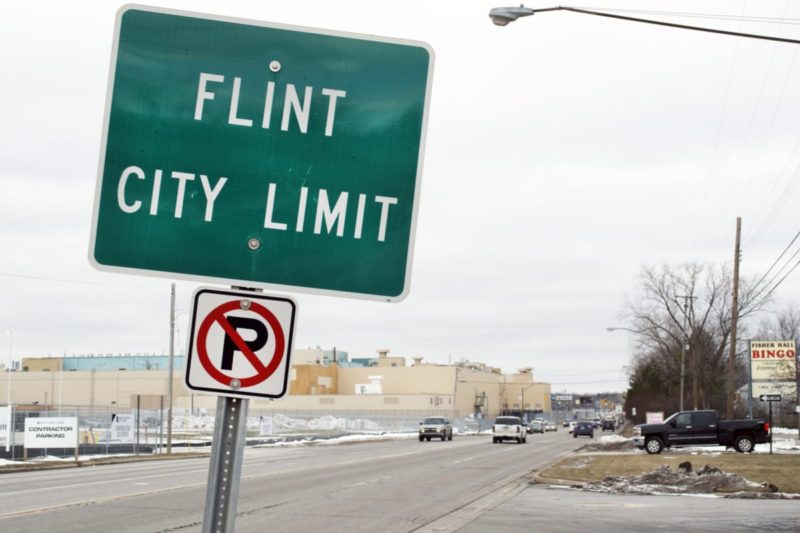Flint Faces Critical Deadline to Choose a Water Source (Updated)
"You cannot push the city into a corner with two very poor options. The residents of Flint deserve so much better than this. In fact they need it."

UPDATE, October 25, 4:17 p.m.: Despite a judge’s order to come up with a long-term solution, the Flint City Council voted Monday for a two-year contract with the Great Lakes Water Authority, which has supplied the city’s water since 2015, the Associated Press reported.
Three years into the Flint water crisis, the clock is ticking and a federal judge has ordered the city council to clean up its act.
City officials must choose a long-term source of drinking water by Monday, U.S. District Judge David M. Lawson ordered in a summary judgment. Judge Lawson noted “the Council has had abundant opportunities to exercise its prerogatives in choosing a long-term water source, and has failed at every turn through its inaction.”
The council has dragged its feet for months and failed to secure a long-term solution for the struggling city’s water supply. Lawson blasted council members on October 17 for their “breathtaking” failure of leadership, ordering them to act immediately.
The Environmental Protection Agency (EPA), the Michigan Department of Environmental Quality, and city administrators support entering into a long-term water supply deal with the city of Detroit via the regional Great Lakes Water Authority (GLWA). But city council members have favored a plan to contract with the Karegnondi Water Authority to treat raw water from Lake Huron at a city plant.
Flint activist Melissa Mays told Rewire that she would like to see the city council and the mayor agree on a plan to remain on the Detroit source until all of Flint’s tainted infrastructure is replaced and a new water treatment plant is built.
“This way we wouldn’t be handing 30 years of payments and control over to Detroit nor would we be making yet another untested water source switch that could poison us all over again by going to the Karegnondi Water Authority,” she said.
The water crisis began when the city switched its water source from Lake Huron to the highly corrosive Flint River in April 2014 without using necessary anti-corrosive treatments. The tainted water ate away at Flint’s aging infrastructure, leaching lead from the pipes into the water supply of a largely non-white and low-income city of 100,000.
Flint has used the Detroit water supply as a stopgap measure since October 2015, and Mayor Karen Weaver is worried a new water source could create more problems for the city. But some council members are concerned that Detroit water could become the more expensive option. Ninth Ward Councilman Scott Kincaid told the Detroit Free Press that Flint’s water rates are the highest in the state because of rate increases passed onto residents by the GLWA.
Cost-saving measures, however, are what initially led to the city’s water crisis. With residents still struggling with health issues and the lack of access to clean water, some worry that cost—and politics—might add to the city’s catastrophic problems.
“Their priorities are not with the people,” Mays said of the city council members who support switching to the Karegnondi Water Authority. “Thankfully, there is an election coming up next month.”
Karina Petri, founder of Project Flint, told Rewire that a 30-year contract with the GLWA leaves the younger generation unprotected if unforeseen issues arise, while the Karegnondi option is just plain “deceptive,” since it’s unclear how reliable the water quality is.
“People need to do more research and begin thinking outside of the box, look at the bigger picture. You cannot push the city into a corner with two very poor options,” she said. “The residents of Flint deserve so much better than this. In fact they need it. Their current and future lives depend on the right decisions being made, today.”
The push to choose came in June when the state Department of Environmental Quality sued the city for violating a settlement agreement in a civil lawsuit, the Safe Drinking Water Act, and an emergency administrative order issued by the EPA.
City council members then voted to extend the GLWA contract until September. Last month, they voted to extend it to the end of October, but they did not follow Weaver’s recommendation that the city sign a 30-year contract.
“The recommendation I put forth would also avoid a projected 55 percent water rate increase and ensure the City of Flint gets millions of dollars to continue replacing lead tainted pipes, and make much-needed repairs to our damaged infrastructure so we are able to deliver quality water to residents,” Weaver said in a statement after reviewing Lawson’s order. “I appreciate Judge Lawson for recognizing there is no need to wait to make a decision that could have, and should have, been made months ago. We can only hope that now City Council will put the people of Flint first, and comply with the judge’s order so we can move forward.”
Whether that decision will be made by Monday is anyone’s guess. Activists doubt it. It wouldn’t be the first time deadlines have passed and orders have been ignored in Flint.
Petri wants to have faith in the council, she said, but she doesn’t think the decision is coming any time soon. A federal judge may have to make that choice for the city.
